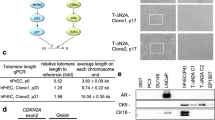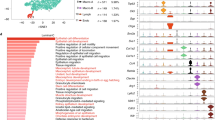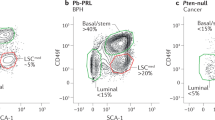Abstract
Epithelial cell transformation has been demonstrated in numerous animal models for the study of solid tumor biology. However, little evidence exists for human epithelial cell transformation without previous immortalization via genetic influences such as SV40 T-antigen, thus limiting our knowledge of the events that can transform naive human epithelium. Here we describe a system developed in our laboratory to directly transform freshly isolated primary human prostate epithelial cells without previous culture or immortalization. Prostate tissue is obtained from patients and benign tissue is separated from malignant tissue. Benign and malignant tissues are mechanically and enzymatically dissociated to single cells overnight, and immune cells and epithelial subsets are isolated on the basis of differential expression of surface antigens. Epithelial progenitor cells are transduced with lentiviruses expressing oncogenes and combined with inductive stroma for in vivo studies. At 8–16 weeks after transplantation into immune-deficient mice, the development of lesions, histologically classified as benign prostate, prostatic intraepithelial neoplasia and adenocarcinoma, can be evaluated.
This is a preview of subscription content, access via your institution
Access options
Subscribe to this journal
Receive 12 print issues and online access
$259.00 per year
only $21.58 per issue
Buy this article
- Purchase on Springer Link
- Instant access to full article PDF
Prices may be subject to local taxes which are calculated during checkout




Similar content being viewed by others
References
Lawson, D.A. et al. Basal epithelial stem cells are efficient targets for prostate cancer initiation. Proc. Natl. Acad. Sci. USA 107, 2610–2615 (2010).
Goldstein, A.S., Huang, J., Guo, C., Garraway, I.P. & Witte, O.N. Identification of a cell of origin for human prostate cancer. Science 329, 568–571 (2010).
Mulholland, D.J. et al. Lin−Sca-1+CD49fhigh stem/progenitors are tumor-initiating cells in the PTEN-null prostate cancer model. Cancer Res. 69, 8555–8562 (2009).
Barker, N. et al. Crypt stem cells as the cells-of-origin of intestinal cancer. Nature 457, 608–611 (2009).
Vries, R.G., Huch, M. & Clevers, H. Stem cells and cancer of the stomach and intestine. Mol. Oncol. 4, 373–384 (2010).
Collins, A.T., Habib, F.K., Maitland, N.J. & Neal, D.E. Identification and isolation of human prostate epithelial stem cells based on α2β1-integrin expression. J. Cell. Sci. 114, 3865–3872 (2001).
Olumi, A.F. et al. Carcinoma-associated fibroblasts direct tumor progression of initiated human prostatic epithelium. Cancer Res. 59, 5002–5011 (1999).
Goldstein, A.S. et al. Trop2 identifies a subpopulation of murine and human prostate basal cells with stem cell characteristics. Proc. Natl Acad. Sci. USA 105, 20882–20887 (2008).
Xin, L., Ide, H., Kim, Y., Dubey, P. & Witte, O.N. In vivo regeneration of murine prostate from dissociated cell populations of postnatal epithelia and urogenital sinus mesenchyme. Proc. Natl. Acad. Sci. USA 100 (Suppl 1), 11896–11903 (2003).
Lukacs, R.U., Goldstein, A.S., Lawson, D.A., Cheng, D. & Witte, O.N. Isolation, cultivation and characterization of adult murine prostate stem cells. Nat. Protoc. 5, 702–713 (2010).
Klein, K.A. et al. Progression of metastatic human prostate cancer to androgen independence in immunodeficient SCID mice. Nat. Med. 3, 402–408 (1997).
Wang, S. et al. Prostate-specific deletion of the murine PTEN tumor suppressor gene leads to metastatic prostate cancer. Cancer Cell 4, 209–221 (2003).
Ellwood-Yen, K. et al. Myc-driven murine prostate cancer shares molecular features with human prostate tumors. Cancer Cell 4, 223–238 (2003).
Greenberg, N.M. et al. Prostate cancer in a transgenic mouse. Proc. Natl. Acad. Sci. USA 92, 3439–3443 (1995).
Priolo, C. et al. Establishment and genomic characterization of mouse xenografts of human primary prostate tumors. Am. J. Pathol. 176, 1901–1913 (2010).
McLaughlin, J. et al. Sustained suppression of Bcr-Abl-driven lymphoid leukemia by microRNA mimics. Proc. Natl. Acad. Sci. USA 104, 20501–20506 (2007).
Tiscornia, G., Singer, O. & Verma, I.M. Production and purification of lentiviral vectors. Nat. Protoc. 1, 241–245 (2006).
Acknowledgements
We thank members of the Witte lab for helpful comments and testing of the protocol. We thank I. Verma (Salk Institute for Biological Studies) for generously providing lentiviral vectors. A.S.G. is supported by the Warsaw Family Research Fellowship and a Dissertation Year Fellowship from the Graduate Division at the University of California, Los Angeles (UCLA). J.M.D. is supported by the UCLA Tumor Biology Program (US Department of Health and Human Services, Ruth L. Kirschstein Institutional National Research Service Award no. T32 CA009056). D.L.B. is supported by a Postgraduate Scholarship from the Natural Sciences and Engineering Research Council of Canada. J.H. is supported by the American Cancer Society, the Department of Defense (DOD) Prostate Cancer Research Program and the UCLA Specialized Program of Research Excellence in Prostate Cancer (principal investigator, R. Reiter). J.H. and O.N.W. are supported by a Prostate Cancer Foundation Challenge Award. O.N.W. is an investigator of the Howard Hughes Medical Institute.
Author information
Authors and Affiliations
Contributions
A.S.G., D.L.B., H.Z., J.H., R.E.R. and O.N.W. contributed to protocol development. A.S.G., J.M.D., D.L.B. and H.Z. generated the figures. A.S.G., J.M.D., D.S.F. and O.N.W. wrote the paper.
Corresponding author
Ethics declarations
Competing interests
The authors declare no competing financial interests.
Rights and permissions
About this article
Cite this article
Goldstein, A., Drake, J., Burnes, D. et al. Purification and direct transformation of epithelial progenitor cells from primary human prostate. Nat Protoc 6, 656–667 (2011). https://doi.org/10.1038/nprot.2011.317
Published:
Issue Date:
DOI: https://doi.org/10.1038/nprot.2011.317
This article is cited by
-
A Simple Efficient Inexpensive Device for Separation of Trypsinized Cells from Tissue Fragments
Stem Cell Reviews and Reports (2024)
-
Prostate luminal progenitor cells: from mouse to human, from health to disease
Nature Reviews Urology (2022)
-
Characterization of a castrate-resistant prostate cancer xenograft derived from a patient of West African ancestry
Prostate Cancer and Prostatic Diseases (2022)
-
Towards organoid culture without Matrigel
Communications Biology (2021)
-
Obesity-associated inflammation induces androgenic to estrogenic switch in the prostate gland
Prostate Cancer and Prostatic Diseases (2020)
Comments
By submitting a comment you agree to abide by our Terms and Community Guidelines. If you find something abusive or that does not comply with our terms or guidelines please flag it as inappropriate.



